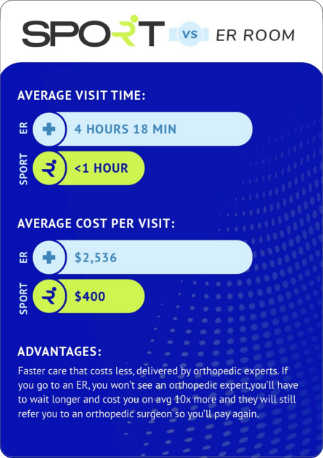Fast, High-Quality
Orthopedic Specialist Care
Our Locations
We have three convenient orthopedic urgent care locations in Dallas, Frisco, and Wylie, TX. Our clinics accept walk-ins. We offer Saturday hours (Dallas location ONLY), and provide competitive pricing. We also accept most major forms of insurance and have affordable cash pricing. With on-site orthopedic specialists and physical therapists, you can trust that we’ll help get you back on your feet and living your active life again.
immediate orthopedic care
If you’re in need of immediate orthopedic care, SPORT is here for you. Skip the long wait at the emergency room and receive high-quality, compassionate care from leading orthopedic specialists at SPORT Orthopedics + Physical Therapy. Book an appointment online or simply walk into one of our convenient locations, and we’ll get you treated as quickly as possible.


Trending Specialties
Orthopedic Surgeons
in Frisco, Dallas, Prosper, and Wylie, TX
OUR PROCESS
Appointment
to life
Surgeries We Perform
Join
our Team


Texas Youth
Sports Medicine Foundation
We’re in network
with most insurance plans





*We accept most all insurance plans, if you do not see your plan listed above or have any questions, please contact our office.

NOT READY TO SCHEDULE YOUR APPOINTMENT YET?
SPORT Orthopedics + Physical
Therapy – Dallas, TX
Services:
• Clinic • Orthopedic • Urgent Care
• Physical Therapy
18152 Preston Road
Suite I-2
Dallas, TX 75252
Phone: (469) 200-2832
Fax: (469) 269-1074
SPORT Orthopedics + Physical Therapy – Frisco, TX
Services:
• Clinic • Orthopedic • Urgent Care
• Physical Therapy
9255 Dallas Parkway
Suite I20
Frisco, TX 75033
Phone: (469) 200-2832
Fax: (469) 269-1074
SPORT Orthopedics + Physical
Therapy – Wylie, TX
Services:
• Clinic • Orthopedic • Urgent Care
• Physical Therapy
3400 FM 544
Suite 650
Wylie, TX 75098
Phone: (469) 200-2832
Fax: (469) 269-1074
SPORT Physical
Therapy – Prosper, TX
Services:
• Physical Therapy
790 N Preston Rd
Suite 60
Prosper, TX 75078
Phone: (469) 850-0201
Fax: (469) 269-1074
SPORT Orthopedics – Mesquite, TX
Services:
• Clinic
• Orthopedic
• Urgent Care
1102 North Galloway Ave
Mesquite, TX 75149
Phone: (469) 200-2832
Fax: (469) 269-1074

